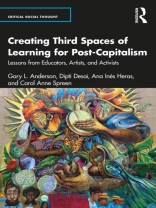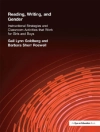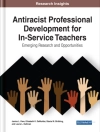In this book, the authors’ post-capitalist approach to change focuses less on what we need to dismantle and more on what educators and activists are building in its place. Studying schools and other social organizations in the Global North and South, the authors identify and examine some of the most interesting counterhegemonic spaces in both formal and informal education today. They view these spaces through a lens of what Gloria Anzaldua and Homi Bhabha call borderlands or "third spaces." These third spaces are created in-between our lived cultural and social identities (first space) and the dominant culture that seeks to define us (second space). This book seeks to better understand how these third spaces conceive of learning, how they are created, the range of experiences among them, the obstacles they face, how they are sustained over time, and how they have built global networks of solidarity. The creation of global networks of third spaces not only signals a shift in progressive political strategy but also an expansion of what counts as spaces that are educational.This book is well suited to graduate and upper-level undergraduate courses in politics of education, sociology of education, education policy, as well as the humanities, sociology, political science, and the arts.
Gary L. Anderson & Dipti Desai
Creating Third Spaces of Learning for Post-Capitalism [PDF ebook]
Lessons from Educators, Artists, and Activists
Creating Third Spaces of Learning for Post-Capitalism [PDF ebook]
Lessons from Educators, Artists, and Activists
Cumpărați această carte electronică și primiți încă 1 GRATUIT!
Limba Engleză ● Format PDF ● Pagini 204 ● ISBN 9781000853575 ● Editura Taylor and Francis ● Publicat 2023 ● Descărcabil 3 ori ● Valută EUR ● ID 8850069 ● Protecție împotriva copiilor Adobe DRM
Necesită un cititor de ebook capabil de DRM












